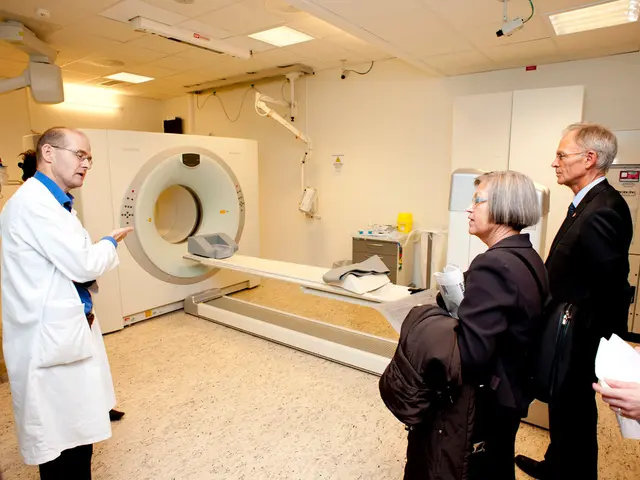Business Education Revolution: Reinventing Learning Processes via Technological Advancements
Transforming Business Education Through Technology
The progressive integration of technology in business education has become a driving force, redefining learning and teaching methodologies across the academic landscape. From traditional classrooms to dynamic digital environments, the transition has been marked by growing reliance on technology and innovative educational practices.
Initially, the introduction of basic computer technology signified a pioneering shift, providing students with increased access to information and enabling interactive engagement with business concepts. As technology further advanced, the internet revolutionized access to knowledge, connecting learners through online courses, webinars, and collaborative projects across borders.
Current trends highlight the growing use of technology to enhance educational experiences, with artificial intelligence (AI) and big data analytics playing significant roles. AI has allowed educators to tailor learning paths according to individual student performance and learning styles, creating a more effective and engaging learning experience [1][2]. Moreover, integrating AI has streamlined administrative tasks [3], enabling educators to devote more attention to teaching and mentoring.
The rise of mobile devices and applications grants students flexibility to access study materials and collaborate with peers anytime and anywhere [4]. Additionally, platforms such as Learning Management Systems (LMS), virtual classrooms, and simulation software promote experiential learning, extending beyond traditional lectures [5].
In terms of soft skills, technology facilitates the development of digital collaboration tools and online networking platforms, preparing future business leaders to navigate the complexities of the modern world [6]. These advancements not only enrich the educational experience but also foster competencies vital for thriving in a rapidly digitalizing economy.
The shift towards virtual classrooms represents a strategic change, offering greater flexibility and inclusivity in education. Virtual learning accommodates schedules, making it ideal for working professionals, while multimedia content fosters dynamic and engaging course materials [7]. Despite challenges in maintaining student engagement and ensuring educational quality, educators are adapting to create an environment conducive to effective learning [8].
As business education adapts to the digital paradigm, constant evolution of teaching methodologies and technological tools becomes essential. Embracing these advancements promises a valuable learning experience for students in the ever-evolving digital business sphere.
Enrichment Data
Some key aspects of technology's impact on business education include personalization, accessibility, and relevance in a rapidly transforming business environment. This transformation is evident in the growing emphasis on online and digital platforms, the integration of AI and data analytics, the blending of business with technology, and experiential learning programs [9]. Additionally, administrative processes have been streamlined through technology [10].
References:[1] "'How Big Data Could Change the Face of Education': Harvard Researchers Discuss Potential Benefits of Analytics in School" - Harvard Gazette, November 1, 2013. https://news.harvard.edu/gazette/story/2013/11/big-data-could-transform-education/[2] "Bringing AI to Business Education: What Schools Need to Know" - EdTech Magazine, April 18, 2018. https://www.edtechmagazine.com/higher/article/2018/04/bringing-ai-business-education-what-schools-need-know[3] "AI Assistance for Admissions Teams" - Digital Campus, The Chronicle of Higher Education, March 15, 2019. https://www.chronicle.com/interactives/digital-campus/ai-6[4] "The Role and Value of Mobile Devices and Applications in Education" - Journal of Educational Technology & Society, Volume 23, Number 1, March 2020. https://www.jetsonline.com/index.php/jets/article/view/649[5] "Blending Business and Technology: Emerging Trends in Educational Programs" - Journal of Business Education, October 2017. https://www.idealfuture.com/blog/blending-business-and-technology-emerging-trends-in-educational-programs/[6] "The Future of Work and Education: Navigating Shift and Scale" - Report of the World Economic Forum, January 2016. https://www3.weforum.org/docs/WEF_Future_of_Work_and_Education.pdf[7] "Best Practices for Teaching and Learning Online: A Review of Research from the U.S. Department of Education" - Teaching and Learning in Higher Education Program, 2013. https://www2.ed.gov/rschstat/eval/online/pubs/best_practices.pdf[8] "Challenges and Opportunities in Online Learning: A Systematic Review of Research Evidence" - Journal of Computer Assisted Learning, Volume 23, Issue 2, April 2007. https://onlinelibrary.wiley.com/doi/abs/10.1111/j.1365-2729.2005.00084.x[9] "The Impact of Technology on Business Education" -Centre for Teaching Excellence, University of Waterloo, 2018. https://uwaterloo.ca/centre-for-teaching-excellence/about-us/resources-for-teaching-and-learning-programs/impact-technology-business-education[10] "The Changing Role of IT in Higher Education" - Educause, June 2009. https://er.educause.edu/articles/2009/6/the-changing-role-of-it-in-higher-education
- The growing adoption of artificial intelligence in education revolutionizes the learning process, allowing for personalized learning paths that cater to individual student's performance and learning styles.
- Science, technology, and education-and-self-development have merged, with online learning becoming a global phenomenon, offering access to education from any location.
- Virtual reality technologies in business education promote experiential learning, enhancing the understanding of complex business concepts beyond traditional lectures.
- The integration of technology helps foster innovation by providing students with essential skills in digital collaboration and online networking, essential for future leadership in the digital world.
- As technology continues to advance, productivity in business education increases as AI automates administrative tasks, freeing up educators' time to focus on teaching and mentoring.
- Online education platforms and virtual classrooms facilitate flexible and inclusive learning opportunities, making it an ideal choice for working professionals with demanding schedules.
- The synergistic relationship between technology and education can provide a holistic learning experience, benefiting students in terms of overall health and well-being by providing stress-free learning environments and accessible resources at any time.






